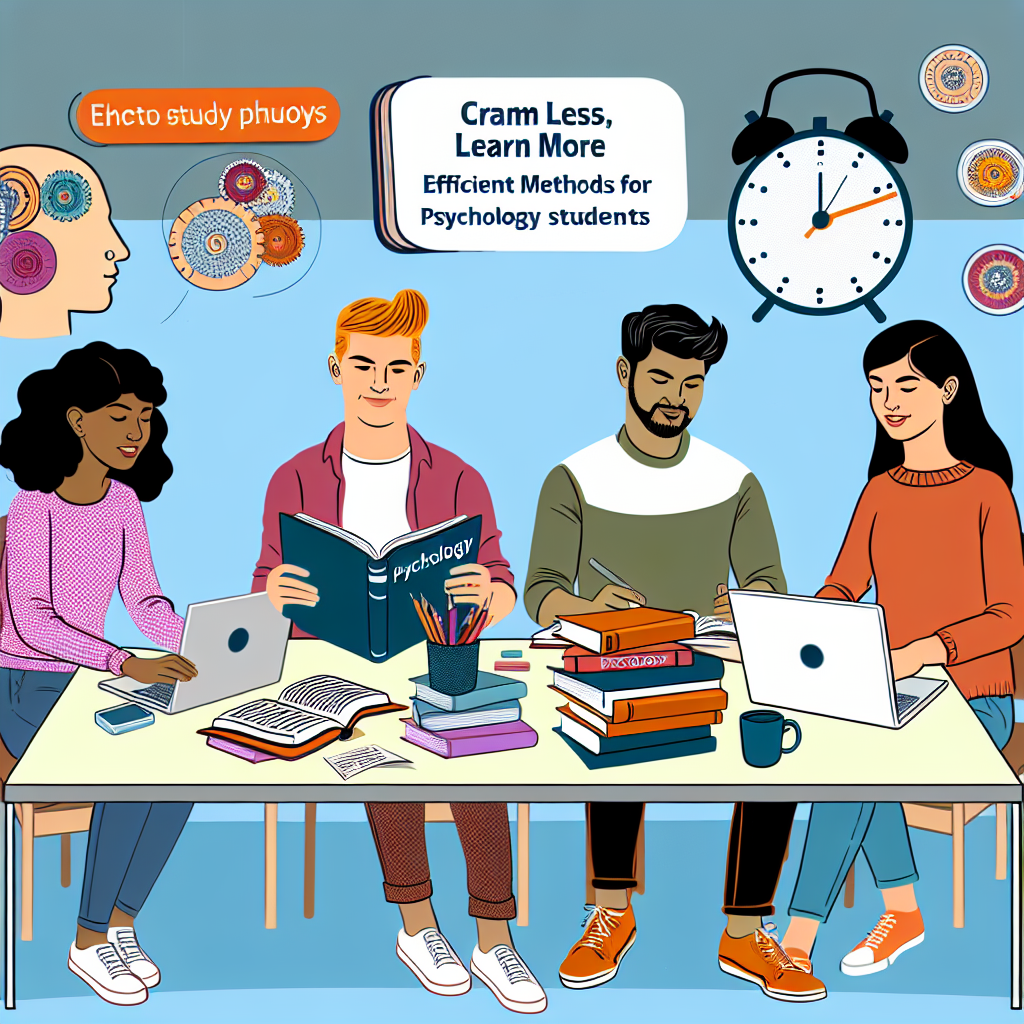Cram Less, Learn More: Proven Study Methods for Psychology Students
Introduction
As a psychology student, you’re on a journey through the complexities of human behavior and thought. You’re tasked with absorbing vast amounts of information—concepts, theories, models, and case studies. It can be overwhelming. The traditional approach of cramming before exams often leads to fatigue, anxiety, and limited retention. Instead, it’s time to redefine your study habits. With the mantra "Cram Less, Learn More: Efficient Study Methods for Psychology Students," we can explore innovative strategies to enhance your learning experience while minimizing stress.
Understanding the Learning Challenge
The Psychology of Learning
Before diving into efficient study methods, it’s vital to understand how we learn. Cognitive psychology emphasizes that memory is not a passive storage system; it’s an active process. Our brains are designed to form pathways through repeated exposure and practice.
The Role of Spaced Repetition
Spaced repetition takes advantage of the brain’s propensity to forget by reintroducing information at increasing intervals. This technique not only strengthens memory but also enhances recall.
Your Learning Style
Recognizing your unique learning style can significantly impact how you approach your studies. Are you a visual, auditory, or kinesthetic learner? Adapting your study methods to fit your style can make a profound difference.
Efficient Study Methods
1. Active Recall: Retrieval Practice
Active recall is a powerful strategy that promotes long-term retention. This involves testing yourself on the material you’ve just studied. Consider creating flashcards or practice quizzes based on your course content.
Case Study: Medical Student Success
A study conducted at a medical school found that students who employed active recall scored 20% higher on exams compared to those who relied on traditional studying techniques. This method is equally applicable for psychology students aiming to internalize complex theories.
2. Pomodoro Technique: Time Management
The Pomodoro Technique, developed by Francesco Cirillo in the late 1980s, is a time management method that utilizes focused work sessions followed by short breaks.
| Duration | Method |
|---|---|
| 25 minutes | Focused study session |
| 5 minutes | Short break |
| After 4 sessions | 15-30 minutes break |
This approach combats mental fatigue and promotes sustained focus, allowing psychology students to absorb information without burnout.
3. Interleaving Practice: Mixing It Up
Instead of studying one topic in depth before moving to the next, interleaving allows you to mix different subjects or types of problems within a single study session.
Case Study: Math & Science Learning
Research on math and science education reveals that students who practiced interleaving retained concepts better than those who studied one type of problem at a time. Psychology students can apply this method by alternating between theories, case studies, and applications within a single study session.
4. Mind Mapping: Visual Organization
Mind mapping involves creating a visual representation of information. This technique can help you connect concepts and organize your thoughts hierarchically.
| Mind Mapping Benefits | Description |
|---|---|
| Enhances memory retention | Visual associations aid recall |
| Encourages creativity | Frees the mind to explore connections |
| Simplifies complex information | Breaks down concepts into digestible parts |
By visually structuring complex theories like Freud’s psychoanalysis or Maslow’s hierarchy of needs, psychology students can see relationships more clearly.
5. Study Groups: Collaborative Learning
Forming study groups can also enhance your learning experience. Engaging with peers fosters discussion, expands understanding, and provides different perspectives on challenging material.
Case Study: Collaborative Efforts in Classroom
A university study found that students who participated in study groups performed significantly better in exams compared to their independently studying counterparts. Such collaboration is particularly effective in fields like psychology, where discussing theories and concepts can lead to deeper insights.
Implementing Efficient Study Methods
Creating a Study Schedule
Developing a structured study schedule is crucial. Plan your study sessions around your classes, exams, and personal commitments. Incorporate techniques like the Pomodoro Technique and active recall to enhance focus.
Tracking Progress
Keep a journal or digital log of your study sessions. Note what methods worked and how effective they were for you. This will allow you to refine your approach continuously.
Staying Motivated
Motivation is key to maintaining efficient study habits. Set achievable goals and reward yourself for reaching them. Celebrate small victories—whether it’s understanding a challenging concept or preparing well for an upcoming quiz.
Conclusion
As we conclude our exploration of "Cram Less, Learn More: Efficient Study Methods for Psychology Students," it’s essential to reflect on the methods discussed. From employing active recall and spaced repetition to engaging in study groups, the techniques available to you are abundant and effective.
The journey of understanding psychology demands a proactive approach to learning. Rather than succumbing to the stress of cramming, embrace these proven strategies. By restructuring your study habits, you not only prepare yourself for academic success but also foster a lifelong love of learning.
FAQs
1. What are the most effective study methods for retaining information?
Active recall, spaced repetition, and interleaving practice are highly effective methods for improving retention.
2. How can I manage my time better while studying?
The Pomodoro Technique can help increase productivity by breaking study sessions into manageable intervals with short breaks.
3. Is it beneficial to study in groups?
Yes! Study groups can enhance understanding, provide diverse perspectives, and increase motivation.
4. How do I know my learning style?
Reflect on your past learning experiences. Identify whether you learn best through visuals, listening, or hands-on activities.
5. What should I do if I feel overwhelmed with studying?
Take breaks, reassess your study techniques, and focus on one topic at a time. Prioritize self-care to manage stress.
By applying these methods, you’re poised to not just excel academically, but also to enhance your understanding of psychology profoundly. Embrace the journey, and remember: the more efficiently you study, the more you can enjoy learning!

